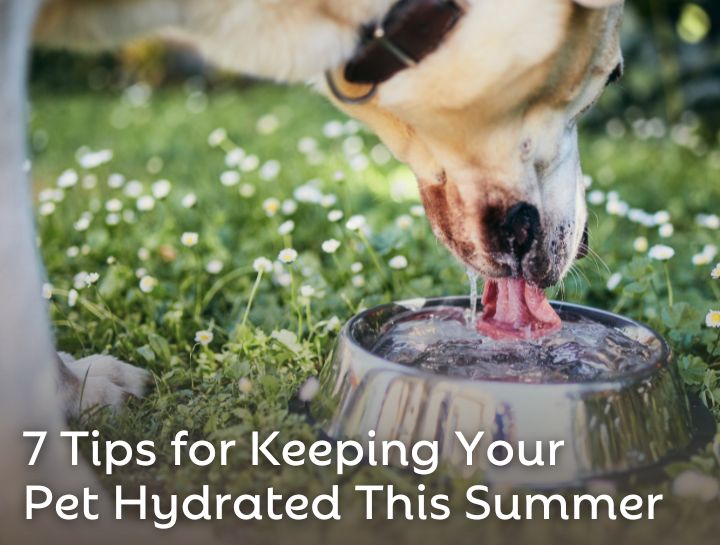7 Tips for Keeping Your Pet Hydrated This Summer

July is National Pet Hydration Awareness Month, a time to focus on the well-being and health of our furry friends by ensuring they stay properly hydrated. While it may seem like a straightforward task, dehydration in pets can have serious consequences, making it crucial for pet owners to be vigilant and proactive in keeping their animals hydrated.
Why is hydration important for pets?
Just like humans, pets need water to survive. Water is vital for maintaining proper bodily functions and plays a significant role in regulating body temperature, aiding digestion, and supporting organ function. Without sufficient hydration, pets can experience various health issues, including kidney problems, urinary tract infections, and heatstroke.
Here are some key tips to help you keep your pets hydrated and healthy this summer:
Fresh Water Supply
Always give your pets access to fresh, clean water. Regularly check their water bowls to ensure they are clean and replenish the water throughout the day, especially during hot weather or if your pet is particularly active. Consider using a pet water fountain, as some pets prefer running water, which can encourage them to drink more. Be sure to clean the water fountain regularly, especially in multi-pet households.
Hydration on the Go
If you're planning outdoor activities with your pet, bring along a portable water bowl and a bottle of water. Take regular breaks to offer your pet water and encourage them to drink. Remember that physical exertion and heat can cause pets to become dehydrated more quickly, so be extra vigilant during these times.
Wet Food and Treats
Talk to your veterinarian about incorporating wet food into your pet's diet, as it contains higher moisture content compared to dry food. Additionally, you can provide hydrating treats such as frozen seedless melon or low-sodium chicken broth ice cubes. These can be a tasty way to increase your pet's fluid intake.
Monitor Water Intake
Pay attention to how much water your pet is drinking on a daily basis. Any significant changes in their water intake could be a sign of an underlying health issue. Excessive thirst or a sudden decrease in water consumption should prompt a visit to the veterinarian for a check-up—call us at (510) 841-4412.
Awareness of Hydration Signs
Educate yourself about the signs of dehydration in pets. These may include dry gums, sunken eyes, lethargy, loss of appetite, dry skin, and excessive panting. If you notice any of these symptoms, seek veterinary care immediately.
Consider Pet-Safe Summer Activities
During the summer months, it's essential to be mindful of the outdoor activities you engage in with your pets. Avoid walking or exercising them during the hottest parts of the day and provide shade and rest breaks during outdoor adventures. Always carry water for both you and your pet.
Regular Veterinary Check-ups
Schedule regular veterinary check-ups for your pets to ensure they are in good health. At University Vet Hospital, our veterinarian can assess their hydration levels, provide guidance on their specific needs, and address any concerns you may have.
National Pet Hydration Awareness Month serves as a timely reminder of the importance of keeping our pets properly hydrated, especially during the hot summer months. By following these tips and being attentive to your pet's needs, you can ensure their well-being and help them stay happy, healthy, and hydrated all year round.
If you have questions about keeping your pet hydrated or would like to schedule an appointment here at University Vet Hospital, give us a call at (510) 841-4412!
